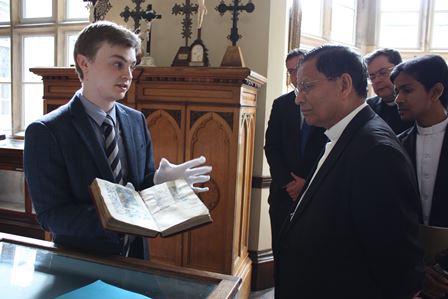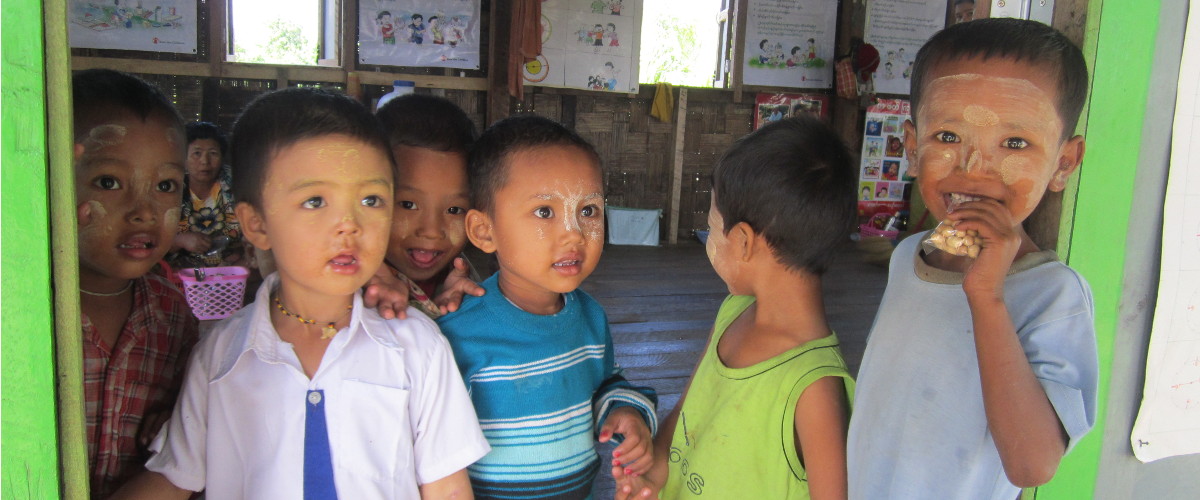The Archbishop of Yangon, Cardinal Charles Maung Bo, delivered an inspiring talk to the students and staff of Stonyhurst College, a Jesuit school in the United Kingdom, when he visited on Saturday May 21. He spoke of the role of the Catholic Church and the struggle for religious freedom in his country Myanmar.
Cardinal Bo opened his speech noting “a deep appreciation and respect for Jesuit scholarship and learning, and a recognition that Jesuits are the best educators … You are the future of your community, your country and the world,” he said, “ and I hope you will play your part in shaping a better future for your generation.”
“To do that, education is key,” he elaborated. “It is vital for any country; it is vital for yours; and it is particularly vital for my country of Myanmar as we begin our journey into a more democratic system, a more open society, and as we confront difficult challenges of nation-building, peace-making, celebrating diversity and tackling poverty.”
He then outlined the political history of Myanmar, its half a century of destructive military rule, and long struggle for democracy. The country’s first credible elections were only held in November 2016 and resulted in Aung Suu Kyi becoming president after 15 long years of house arrest. He outlined how Myanmar still faces great challenges: poverty, education, human trafficking, drugs, protecting freedom of expression, constitutional reform, the economy, health care and a high maternal mortality rate. He also touched on the plight of the Rohingyas, which he described as “an appalling scar on the conscience” of Myanmar.
However, Cardinal Bo is optimistic about the new road his country is now on. “My country now stands on the threshold of hope,” he said. “We have a chance – for the first time in my lifetime – of making progress towards reconciliation and freedom as a nation. There is a vibrant civil society and a freer media. We know that while evil has an expiry date, hope has no expiry date.”
The Catholic Church is present “where the government is not,” he said. “We are in the slums; we are in the camps for internally displaced people; we are working with our friends in the Buddhist and Muslim communities to promote inter-faith harmony; we are providing education, health care and livelihoods; we are advocating for our people.”
“But we too face limitations,” he admitted. “For fifty years, Church schools have been closed, after Ne Win expelled missionaries and seized Church property. And so today I say to the Government of Myanmar: give us back our schools, and allow us to contribute to educating our people”.

He finished with a direct address to the students; “As Aung San Suu Kyi has said, ‘please use your liberty to promote ours’. You, young people of Britain and of your different nations, have the future before you; and you have the opportunity, if you choose to take it, to make yourselves available to God, to open your hearts to His Spirit, to place yourselves in His hands and then, together with Him, to make this world a better place”.
After his talk, Cardinal Bo visited Phase Two of the Christian Heritage Centre where he saw some of the unique collections which touch on the struggle of English Catholics to sustain their own faith during penal times. Cardinal Bo also examined venerated relics of English martyrs and prayed for English Christians that their faith might be strengthened through the knowledge of their story. [Jesuits in Britain]
Read the full transcript of his speech here.
The Jesuits returned to Myanmar in 1998 at the request of the country’s bishops who remembered the good work of American Jesuits from Maryland who had been in charge of the major seminaries in Yangon. Today the Jesuit Myanmar Mission comprises around 40 Jesuits, more than 30 of whom are indigenous to Myanmar and currently in formation. The Society in Myanmar has a candidates program, a novitiate and two educational institutions as well as a social services programme and a variety of services in support of the local church. In 2013, the first Myanmar Jesuit priest was ordained and there are now three Myanmar Jesuit priests.


